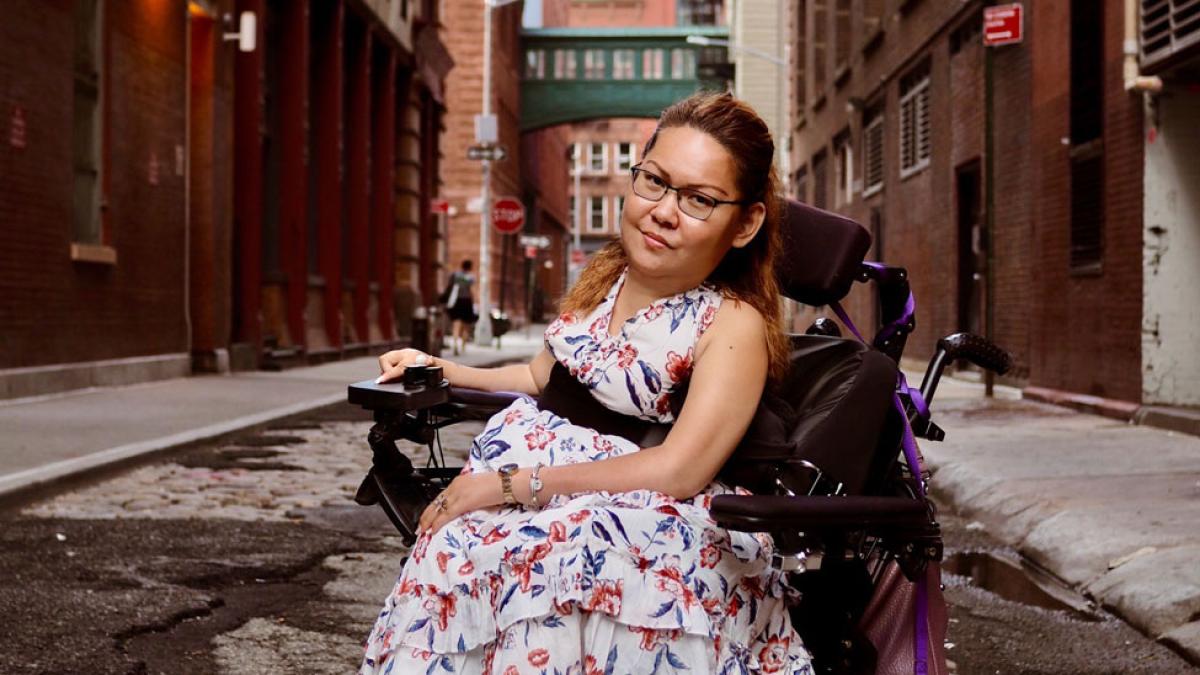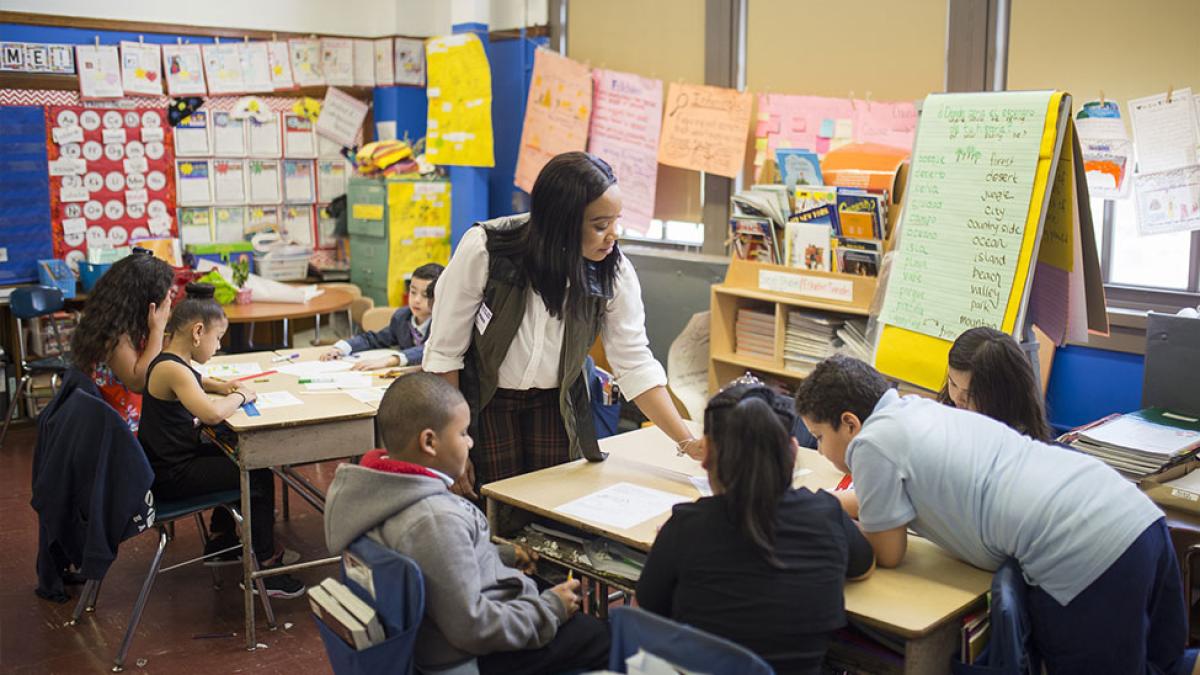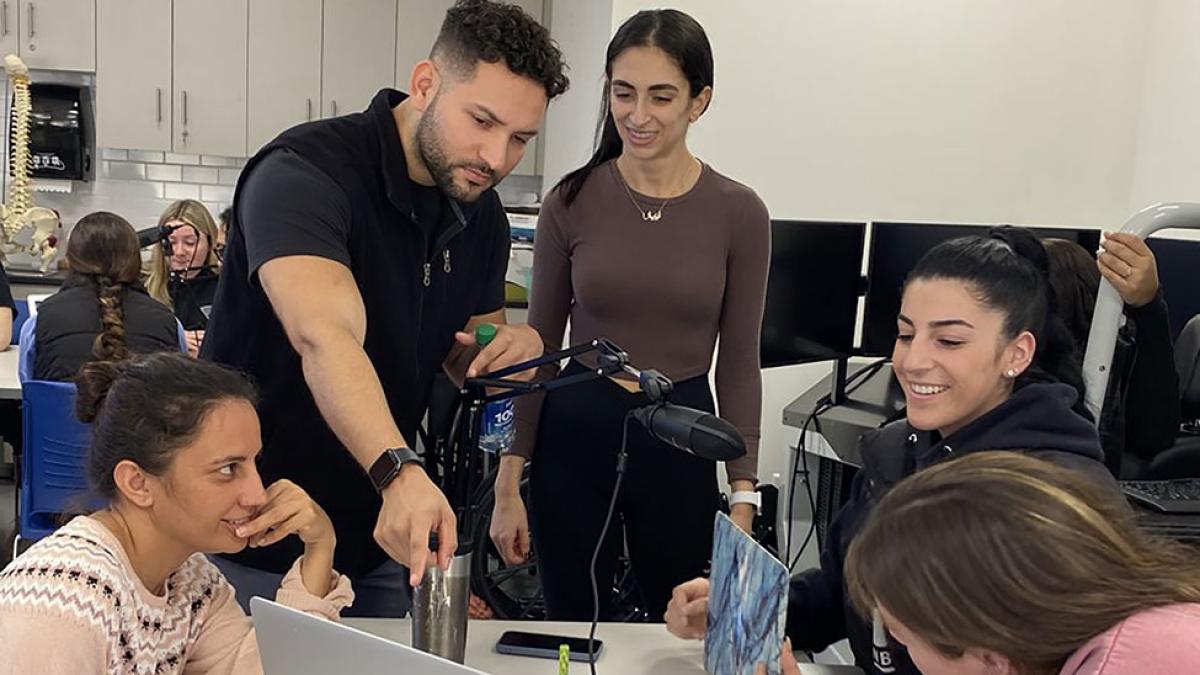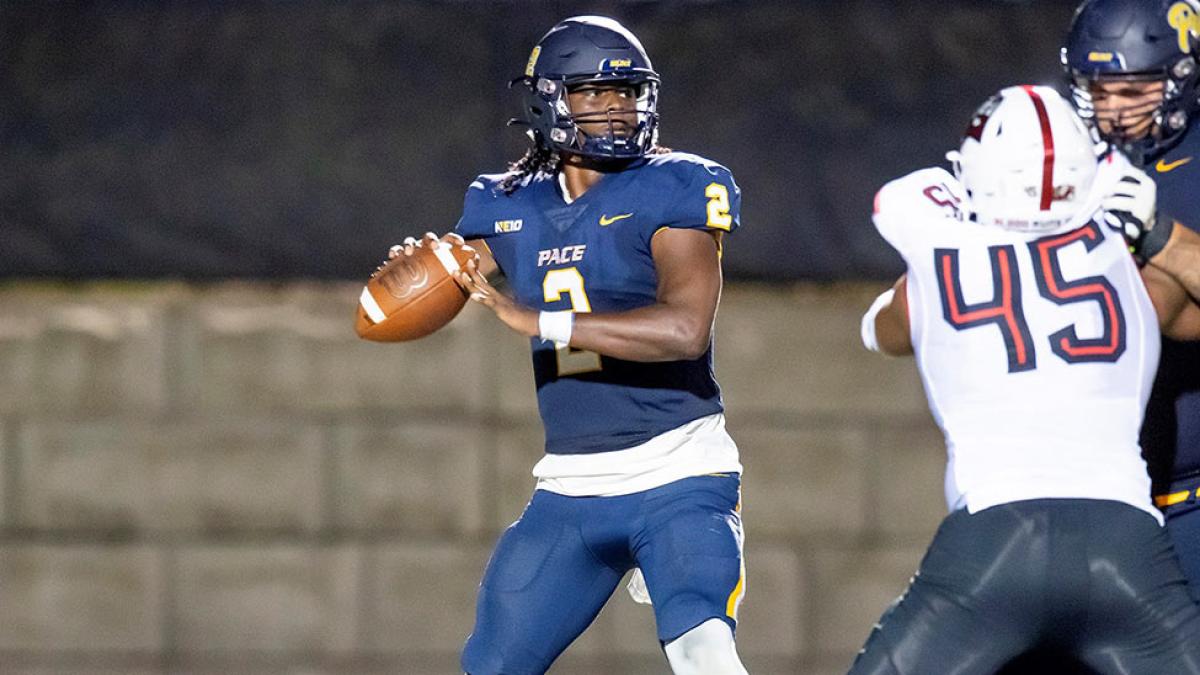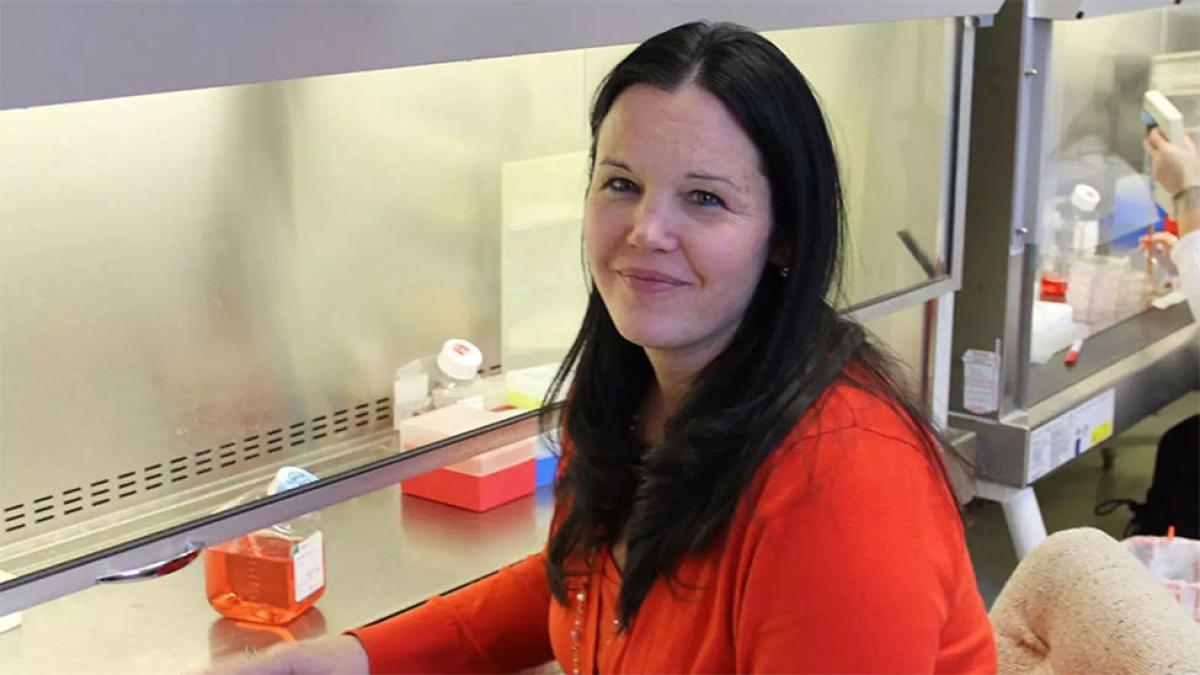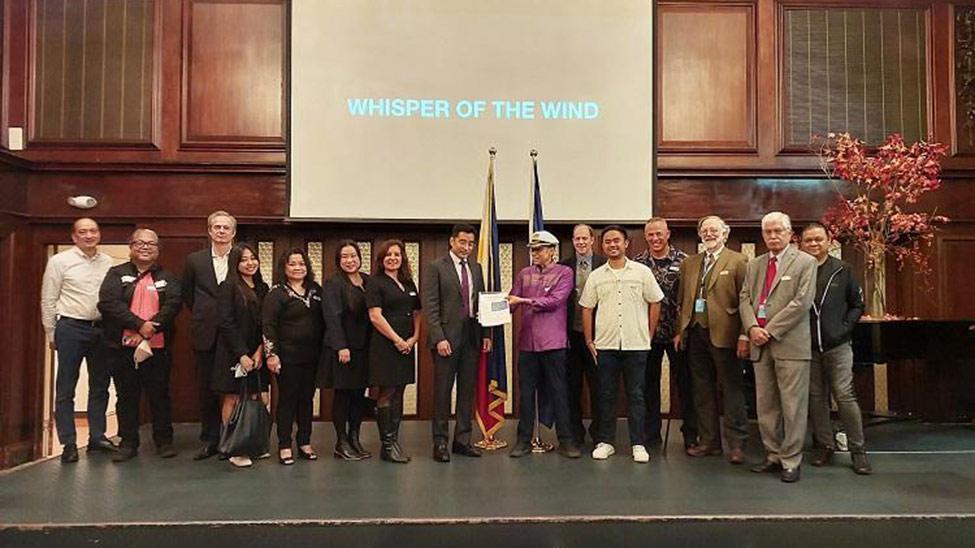
How Professors Can Use Open Educational Resources to Help Our Most Vulnerable Students
Lubin Professor Jessica Magaldi publishes an op-ed in Visible Magazine about how professors can use education resources to help the most vulnerable students.

Trump Organization Hit With Maximum Fine of $1.6 Million for Tax Evasion Scheme
“It spells doom for the Trump Organization —I really see it as a death knell,” Bennett Gershman, Pace University law school and former New York ...
Cryptocurrency past is prologue: before and after FTX
Haub Law’s Professor John Bandler’s column discusses key events in the development of cryptocurrency, from the wild west to law and regulations, and explains what is needed now given that it is here to say.
Elisabeth Haub School of Law at Pace University Joins Normandy Chair for Peace for Historic Global Launch of the Good Stories Movement Aiming to Inspire Climate Action
On October 25, 2022, the Normandy Chair for Peace hosted a global launch of the Good Stories Movement at the Kalayaan (Freedom) Hall of the Philippine Consulate in New York City, in collaboration with the Elisabeth Haub School of Law at Pace University and others. The historic event was attended by faculty, diplomats, members of the media, the academe, judiciary, civil society, and international eco-advocates.


On October 25, 2022, the Normandy Chair for Peace hosted a global launch of the Good Stories Movement at the Kalayaan (Freedom) Hall of the Philippine Consulate in New York City, in collaboration with the Elisabeth Haub School of Law at Pace University and others. The historic event was attended by faculty, diplomats, members of the media, the academe, judiciary, civil society, and international eco-advocates.
"Maybe you and I cannot do great things. We may not change the world. But we can change the story of the world if we change the storyline,” said Filipino Tony Oposa, one of Asia’s leading voices in the global arena of Environmental Law. “Good stories have the power to inspire and set hearts on friendly fire,” he added.
The Good Stories Movement aims to change the world’s narrative from negative to positive, from bad to good, and from sad to happy. To be highlighted are stories of people around the world who are taking care of the Life-Sources of Land, Air, and Water – the LAW of Life, also known as the 'Environment.'
The memorable moment was a cooperative effort of the top-ranked Elisabeth Haub Environmental Law School of Pace University, the International Council for Environmental Law (ICEL), the Indigenous Lenape People, the University of Peace, the Normandy Chair for Peace, the Filipino community, and other international organizations.
Together, they are looking for stories of people and communities who dare to care for the LAW of Life, stories of humans living in harmony with Nature. The stories will be submitted to international organizations for inspiration, appreciation and global gratitude.
To secure well-recorded and legit good stories, the global Eco-Advocates are planning an innovative, non-adversarial, and happy legal action. Instead of always focusing to fight and right the wrong, this legal action creatively uses the Rules of Court to preserve the evidence of the good, the right, and the strong. They plan for a simultaneous filing of the Petitions to Preserve the Evidence (PPE) around the world and in International Courts and Tribunals on June 5, 2023, UN World Environment Day.
“Recording the evidence of good stories to heal the Earth in courts worldwide will demonstrate how people everywhere are making a difference. Grass roots activists are effectively making peace with nature. Their stories will inspire others to emulate their accomplishments,” said Professor Nicholas A. Robinson, Distinguished Professor Emeritus of Environmental Law of the Haub Law School of Pace University.
Concerned people from around the world also filed a Petition to the United Nations for nations to unite. They plead for a sea of controversy in Asia to be transformed into the ASIA MARINE PEACE PARK.
“This is a real-life example of the truth that we will have peace on Earth, when we have peace with the Earth,” said Oposa.
To join the movement, share your stories!
About Normandy Chair for Peace
Normandy D-Day was once a symbol of war. Enlightened leaders of Normandy changed the narrative to become a symbol of Peace. They created the Normandy Chair for Peace … with the Earth. The Chair seeks to nurture and share novel ideas, to spread happy energy, and to spark positive action to contribute to the UN Sustainable Development Goals. The Chair does this through research, scientific diplomacy, and advocacy on the topics of Peace, Environment, and Rights of Future Generations at the local and international levels.
Alumni Affinity
Find your people. Through the Alumni Association’s affinity groups, you can get connected with fellow alumni around a common interest, identity, or purpose.

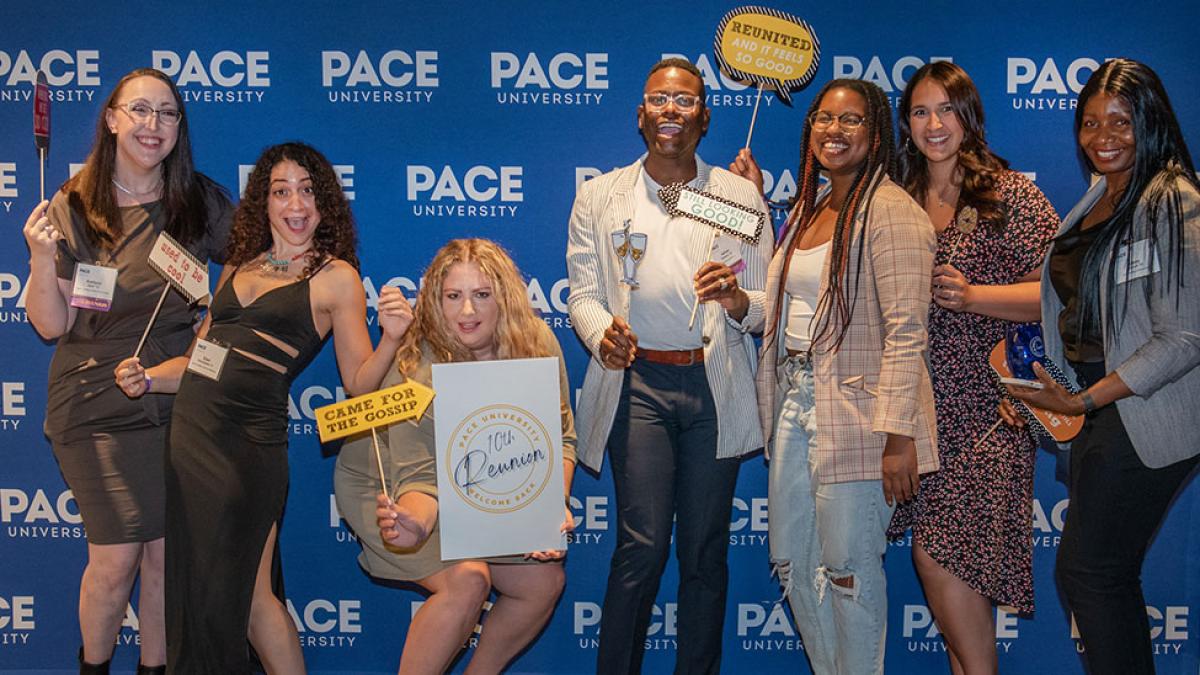
Find your people. Through the Alumni Association’s affinity groups, you can get connected with fellow alumni around a common interest, identity, or purpose.
The Pace University alumni affinity groups are communities of alumni that engage and connect around a common interest, identity, or purpose such as academic majors, current professions and interests, and other ideas from alumni. The alumni affinity groups are charged with providing a forum where diverse experiences, perspectives, and resources can be shared with anyone who is interested. Each alumni affinity group works closely with Pace’s Alumni Relations Department to facilitate events, networking opportunities for alumni, and engagement with student groups. Affinity groups also provide a sense of community and shared values, information and resource sharing, professional and personal development, education and exploration, and community service initiatives.
The current affinity groups include the Alumnae Engagement Committee, the Black Alumni Group, Graduates of the Last Decade (GOLD), and the Pace Pride Alumni Network. Examples of programming that the Affinity Groups have provided are an Alumni Diversity Breakfast, GOLD holiday party, and the creation of the Empowering Women Scholarship Fund.
Want to learn more about joining an affinity group or have an idea about starting your own? Visit the Alumni Association’s affinity groups webpage to learn more.
More from Pace Magazine
The transition into higher education is always bumpy but can be especially challenging for veterans and those leaving active service. A sense of community not only bridges the civilian-veteran gap, but can also improve veteran’s mental health and sense of purpose after service. Two veterans from the Pace Community weigh in on the importance of inclusivity, community, and what it means to be a student veteran.
Meet Tabi Haly '06, the software engineer, singer-songwriter, disability advocate, and proud New Yorker taking a stance.
Through interdisciplinary collaboration, the School of Education and Dyson's Film and Screen Studies departments are helping a major school district in Florida tackle the challenges of today’s teacher shortage head-on.
Solving the Aging Population Care Crisis via the Metaverse
Through an inter-collegiate emerging technology competition, graduate students Chuk Ezuma and Rikin Gajjar developed M3, a product that would enable medical professionals to treat elderly patients using the technology of tomorrow.


Currently, there are over 1.2 million residents in United States nursing homes, and over 800,000 residents of assisted living facilities. As the Baby Boomer population ages, these numbers are projected to skyrocket—by 2050, up to 30 million people in the Americas will require long-term care services.
In other words, there are going to be a lot of people in need of quality care.
Lubin graduate students Chuk Ezuma ’23 and Rikin Gajjar ’23 spent much of the fall semester thinking about how to solve this growing problem. Through participating in the Interactive Case Competition—an emerging technology competition that featured participation from schools including NYU, the University of Maryland, Columbia Business School, just to name a few—Chuk and Rikin developed M3; a wearable product closely resembling traditional eyeglasses that leverages the metaverse to help health professionals provide efficient and effective care for the aging population.
In the world of M3, receiving quality healthcare might not even require a trip to the hospital—it could simply mean a patient can log onto Zoom or Microsoft Teams and be treated by a medical professional, who, via the use of the M3 glasses and the metaverse, will be able to communicate with patients, immediately access records, and record notes, and much more.
“We originally wanted to do something in the metaverse because it’s such a unique concept that we’re all grappling with; trying get a better understanding of the metaverse at large and figuring out ways to utilize and maximize it efficiently,” said Chuk.
“We want to save nurses time. Plus, older patients might not be able to drive, or getting to a hospital could be a headache,” said Rikin. “That’s our mission—save time and provide the best care.”
With their problem-solving concept realized, Chuk and Rikin began working on the logistics of M3. Currently, access to the metaverse is generally done through clunky virtual reality headsets, like Meta’s Quest. Chuk and Rikin’s prototype is much closer to regular, everyday glasses—believing that the combination of continuous technological advancement and research and development will make their product not only possible, but a competitive and innovative entry into the marketplace.
Employing thoughtful touches—such as a solar-powered case for doctors on-the-go, to help prevent constantly needing to charge the glasses—and figuring logistics such as payment, privacy, and HIPAA compliance, gave Chuk and Rikin a crash-course into what developing such a comprehensive product would entail.
That’s our mission—save time and provide the best care.
Presenting at the Interactive Case Competition in front of emerging technology leaders as well as graduate students from other schools, they were encouraged by the reception of M3 and were given great notes as to how to further develop the product. The experience solidified their mutual belief that the metaverse and associated “Web3” technologies are increasingly important for business students to understand, and they were thrilled to have had the opportunity to conceive and develop a product with potentially groundbreaking implications.
“It was a great learning experience, and I would recommend to other classmates,” said Rikin.
“This experience was really eye-opening,” added Chuk. “It solidified my view of entrepreneurship—taking an idea and translating it into action.”
More from Pace Magazine
Through interdisciplinary collaboration, the School of Education and Dyson's Film and Screen Studies departments are helping a major school district in Florida tackle the challenges of today’s teacher shortage head-on.
Meet Tabi Haly '06, the software engineer, singer-songwriter, disability advocate, and proud New Yorker taking a stance.
Learning takes many forms. Thanks to the Office of Research and Graduate Education’s Classroom-Based Research Award, Occupational Therapy Professor Lisa Raymond-Tolan is adding student-created podcasts to her curriculum.
ESG and Small Business: Sustaining a Greater Purpose Beyond Profits
Executive Director and founder of the Center of Sustainable Business Steven Mezzio and Pace alumnus Joseph Kenner '02 along with Alejandra Veltmann and Jose Ignacio Morejon co-published an article in CPA Journal about the growing ESG movement, and how small and medium sized business can rise to the challenge.


“What is driving this ESG movement? A mandate of sorts.”
So begins an article published in CPA Journal. The article, which graced the cover of the journal, was co-written by Lubin Clinical Professor and Executive Director of the Lubin Center for Sustainable Business Steven Mezzio, PhD; CEO of ESG Lynk Alejandra Veltmann; José Ignacio Morejon, executive director of Ecuador-based Sistema B; and Pace alumnus and Greyston CEO Joseph Kenner ’02.
A case in point is recent actions by the US Securities and Exchange Commission (SEC) demonstrating a commitment to greater transparency in ESG impacts by issuers. For example, the SEC recently proposed to enhance disclosures by certain investment advisors and investment companies about ESG investment practices.
As Mezzio explains, ESG pertains to an integrated purpose—or the focus on a triple-bottom-line of people, planet, and profits. “While businesses have historically focused on a singular bottom line—profits—the ESG movement posits that in addition to profit, businesses could equally focus on people and the planet,” he says. In his model, the planet and the people who inhabit it are represented by the E(nvironmental) and S(ocial) in ESG, respectively. Meaning, businesses should contribute to environmental stewardship in a meaningful way and has a social responsibility to all of its stakeholders—from employees, to customers, to investors.
Growing numbers of small and medium-sized enterprises (SME), spanning a range of sectors and geographies are signaling their commitment to an ESG-rooted integrated purpose. According to the article published in the CPA Journal, small and medium-sized enterprises (SMEs) are playing a crucial and unique role in this international ESG movement. SMEs make up approximately 90% of businesses and more than 50% of employment worldwide, they play a critical role in the impact of the international ESG movement.
While larger companies generally have the bandwidth and resources to support and embark on a wide range of ESG-related initiatives, this is not often the case. “SMEs are not as fruitful in terms of resources they can devote,” said Mezzio. “We thought we’d take a step back and think about how they can still proceed down this path with their inherent limitations with SMEs. Whether this is establishing proper benchmarks or reporting metrics, it’s also essential to be upfront with shareholders and stakeholders about company initiatives.”
More from Pace Magazine
Through interdisciplinary collaboration, the School of Education and Dyson's Film and Screen Studies departments are helping a major school district in Florida tackle the challenges of today’s teacher shortage head-on.
From amazing stats to stellar students and alumni, here are just a few of our favorite things.
The Pace Entrepreneurship Studio supports new startups, from ideation to funding—from conception to operation. Our mission is to teach you the "how" and to support the "what"—providing students and alumni with a complete blueprint for establishing successful businesses.
A Faculty View from Alumni Hall
Meet Pace’s newest Faculty in Residence Ramón Emilio Fernández, PhD, as he outlines his aspirations for the position, and say goodbye to outgoing Faculty in Residence Jane Collins, PhD, as she offers reflections on the importance of bridging the gap between students and faculty.
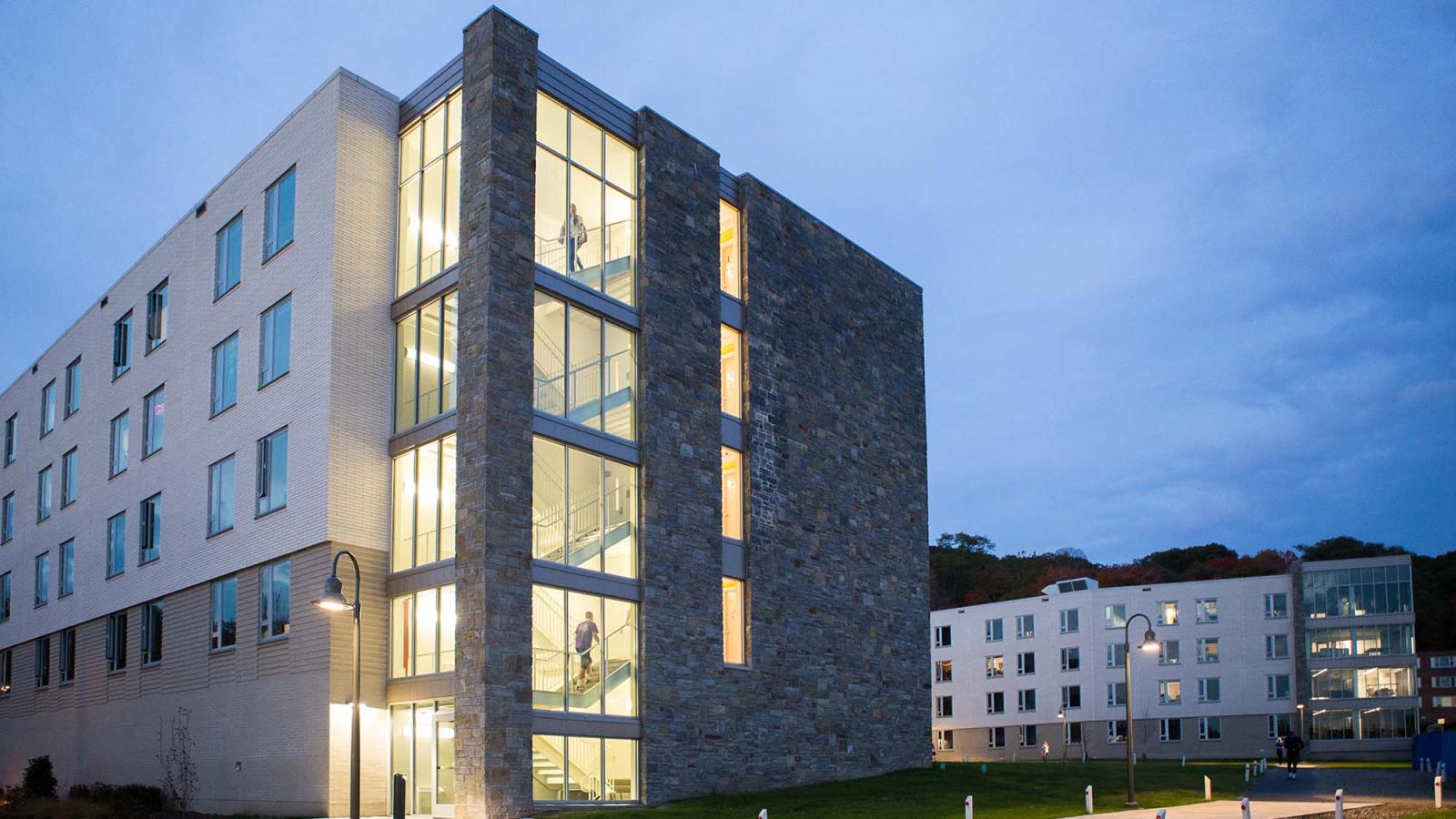
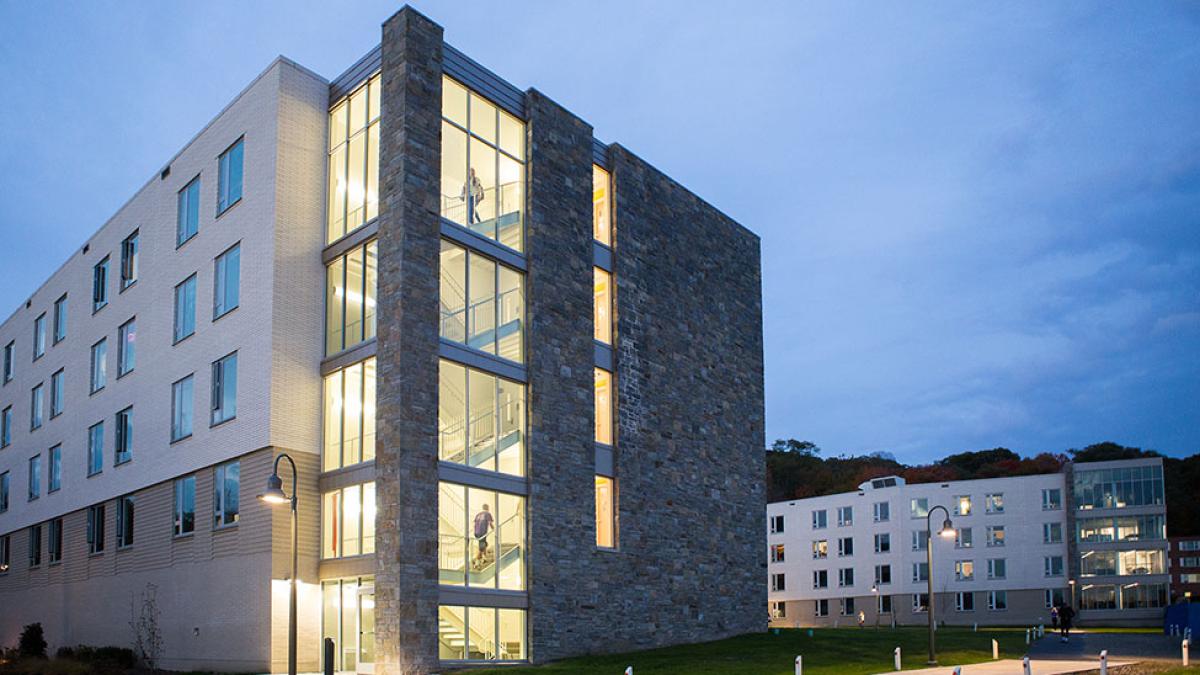
Jane Collins, PhD, has been an associate professor in the department of writing and cultural studies for almost 30 years, and through Pace’s Faculty in Residence program, she’s spent the last three years immersed in what life is like for her students living on the Westchester Campus.
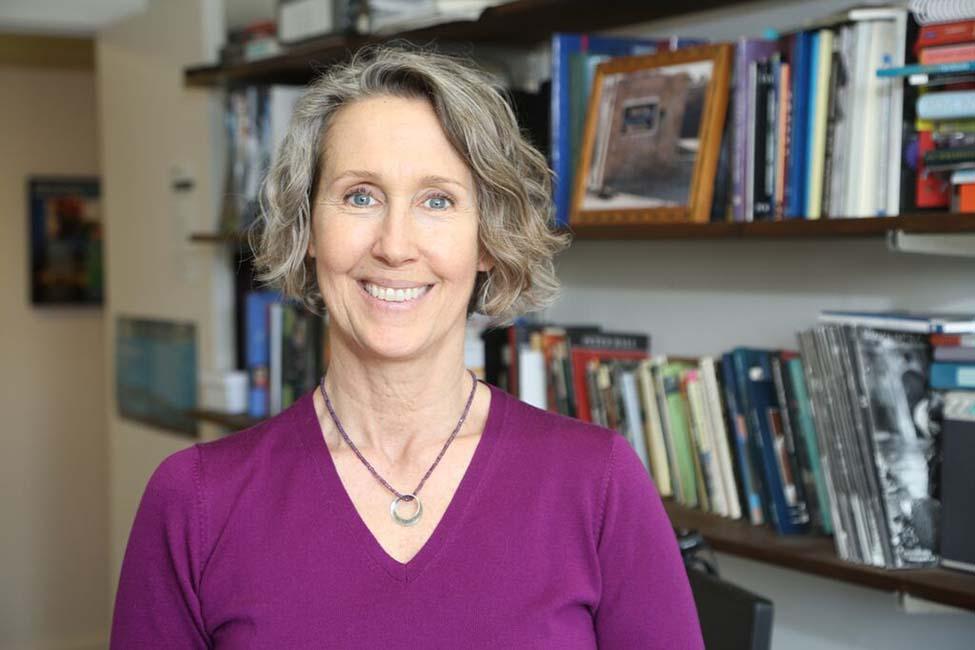
“The residence halls are a space that faculty don’t often go into,” Collins says. “There’s this whole idea of the classroom as the professor’s space that students come into, but what happens when it’s reversed, and the professors are coming into the students’ space?”
Collins has long been interested in how students learn outside the classroom and how they create community. Her desire is for students to not only consider what they want to do after graduation, but how they want to live their lives. Before she stepped into the role of Faculty in Residence, she created the Dyson Scholars in Residence, where students would take courses, live in suites, and complete service projects together as part of a “living learning community.”
There’s something really powerful about having faculty live on campus, and it’s considered a best practice in education.
—Collins
The Faculty in Residence program felt like a natural next step. As part of the program, faculty move into an apartment in a residence hall on the Westchester Campus where they are tasked with creating residential life programming and heading up initiatives aimed at enriching the student life experience. For the past three years Collins has organized hiking trips, knitting clubs, letter writing events, and more with the students living in Alumni Hall. According to Collins, the Faculty in Residence program at Pace is unique in the agency it grants faculty to create programming based on their own interests and the needs of the students.
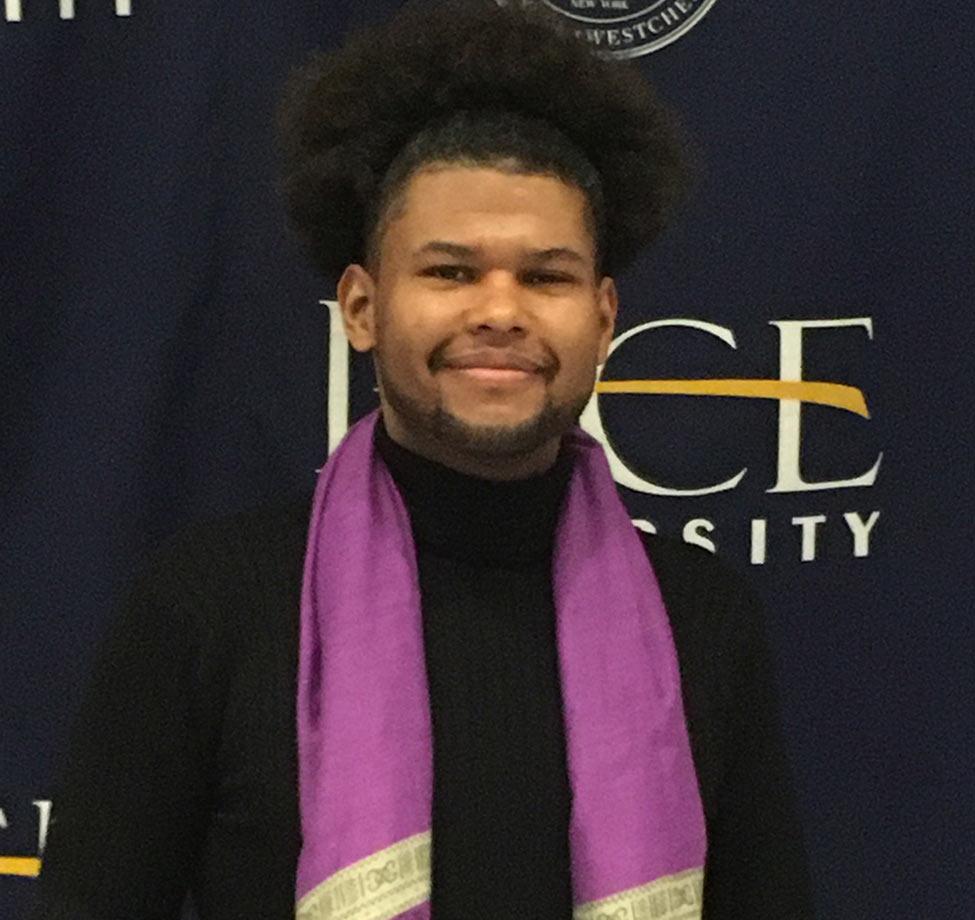
Looking forward to the opportunity to bring his own spin to the program is Ramón Emilio Fernández, PhD, associate professor of mathematics. Like Collins, he has a background in student life (he was a resident assistant and later worked in student life as an undergraduate) and is now taking up the mantle as Pace’s new Faculty in Residence.
Fernández is thrilled at the opportunity to make the position his own. “The name of the game is to have a big picture with flexibility,” he explains. “I like that the program at Pace doesn’t have an agenda; it’s fairly open. My goal is to have faculty and students write the agenda. I have a wealth of experience in student life, and I want to leverage that experience by implementing the ideas of my colleagues who do not have the same experience.”
The name of the game is to have a big picture with flexibility.
—Fernández
Admittedly, Fernández has a million ideas, from cooking nights featuring Dominican cuisine and hosting end-of-the-year celebrations, to establishing dedicated space and attention for commuter and transfer students. But first and foremost, his hope is to connect faculty and staff to students. “During my time at Pace, several of my colleagues have told me they want to know more about student life,” says Fernández. “I think part of why that hasn’t happened is they don’t have a personal relationship with someone that is embedded is student life. So, I’m hoping to do that on a personal level.”
Both Collins and Fernández believe in the importance of bridging the gap between faculty and students. “There’s something really powerful about having faculty live on campus, and it’s considered a best practice in education,” says Collins. “Having that personal one-on-one relationship with a faculty member can offer the student access to information they might otherwise be hesitant to ask for. Students can be nervous about talking to a faculty member because they’re connected to their grade, or success, but it’s easier to ask someone who is just sitting next to you. It can be empowering for students.”
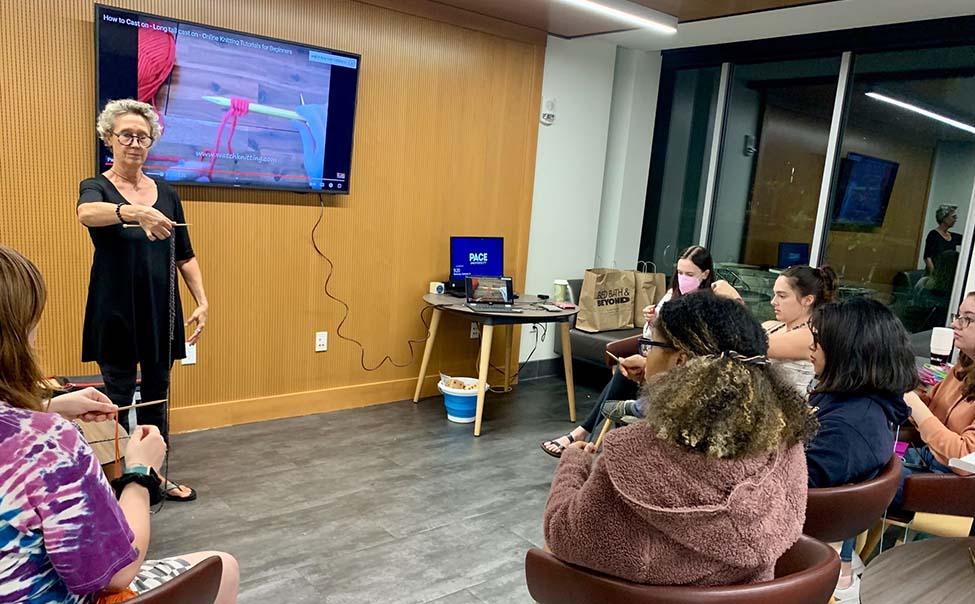
Fernández believes getting faculty, staff, and students to all meet each other halfway has an incalculable effect. “The research is clear. When we start to talk, when we intermingle, everyone’s relationships become healthier,” he states. “I know people like to talk about the bottom line, I like to think of the bottom line as the result of doing great things. Student retention and graduation rates increase. Faculty community commitment increases. Faculty and staff morale, when they feel they belong to something, increases.” As Fernández describes it, when a faculty member has a hand in student events, staff and faculty feel more empowered to get involved and be engaged.
As Collins is finishing her last few months in Alumni Hall and Fernández is busy at work brainstorming even more ideas, Pace students can rest assured they have a faculty who care and want to connect. Collins summed it up simply: “We really have fantastic students and that makes the job a real pleasure.”
More from Pace Magazine
From amazing stats to stellar students and alumni, here are just a few of our favorite things.
Carlton Aiken’s final year as Pace’s QB was a memorable one, earning him a number of well-deserved accolades and a permanent place in Pace Football history.
The Pace Entrepreneurship Studio supports new startups, from ideation to funding—from conception to operation. Our mission is to teach you the "how" and to support the "what"—providing students and alumni with a complete blueprint for establishing successful businesses.
Honoring Athletic Contributions
Meet the Hall of Fame Class of 2022 and the Peter X. Finnerty Leadership Award winners, who were all honored for their incredible contributions to the Pace University Department of Athletics during Homecoming 2022.

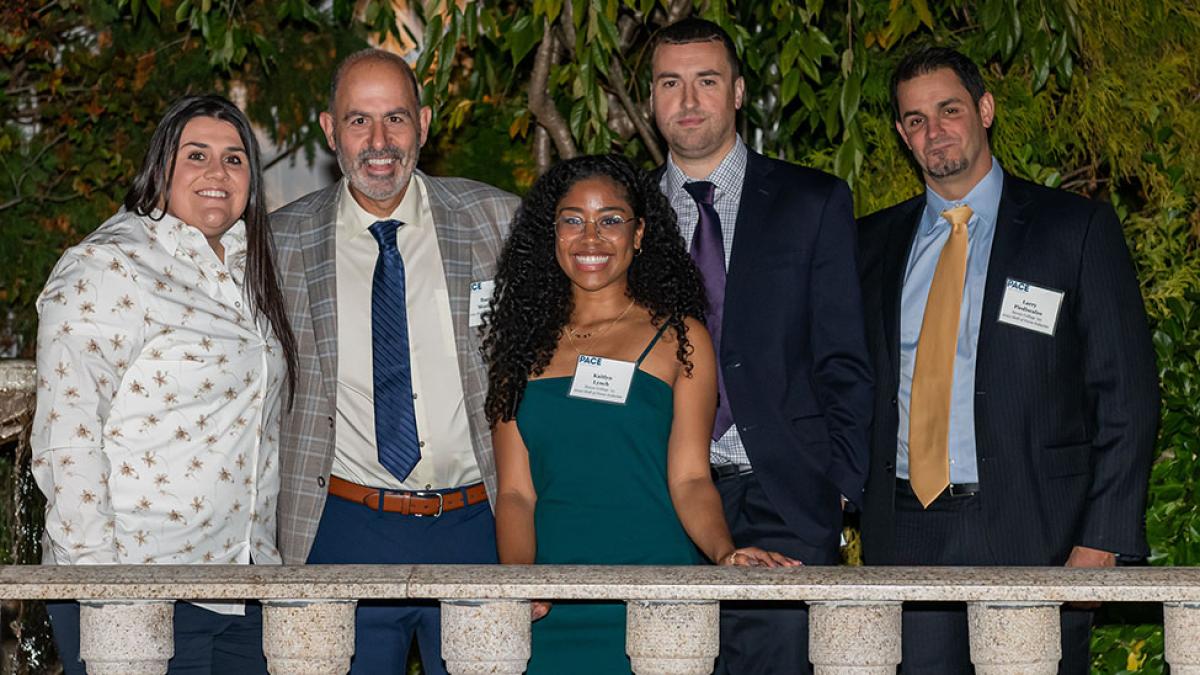
During Pace’s Homecoming celebration in October 2022, the Pace University Department of Athletics was able to resume their tradition of honoring outstanding athletic alumni and staff after a three-year pause. Kaitlyn Lynch '13, Barry Moriarty, Larry Piediscalzo '02, Brittany Shields '12, and Ryan Williams '08 were inducted into the Hall of Fame as the Class of 2022, the 19th enshrined class since the Hall of Fame’s creation in 1997. Alex Rohan '93 and Terri Rohan '96 were recognized for their contributions to Pace Athletics with the Peter X. Finnerty Leadership Award.
"We couldn't be more excited to honor this class of prestigious and dedicated Setters. The Class of 2022 and this year's Peter X. Finnerty Leadership Award winners really embody the 'best of the best' of what Pace Athletics represents," remarked Director of Athletics Mark Brown. "We haven't had the opportunity to have this annual event over the past three years and we really wanted to bring it back bigger and better as a highlight of homecoming weekend."
All seven alumni were recognized at a ceremony and dinner on October 14, 2022 at Westchester Manor, and again during the halftime of the Pace homecoming football game against AIC the next day. But if you weren’t there, you can meet the newest Finnerty Leadership Award honorees and the Hall of Fame Class of 2022 now.
Hall of Fame Class of 2022
Kaitlyn Lynch
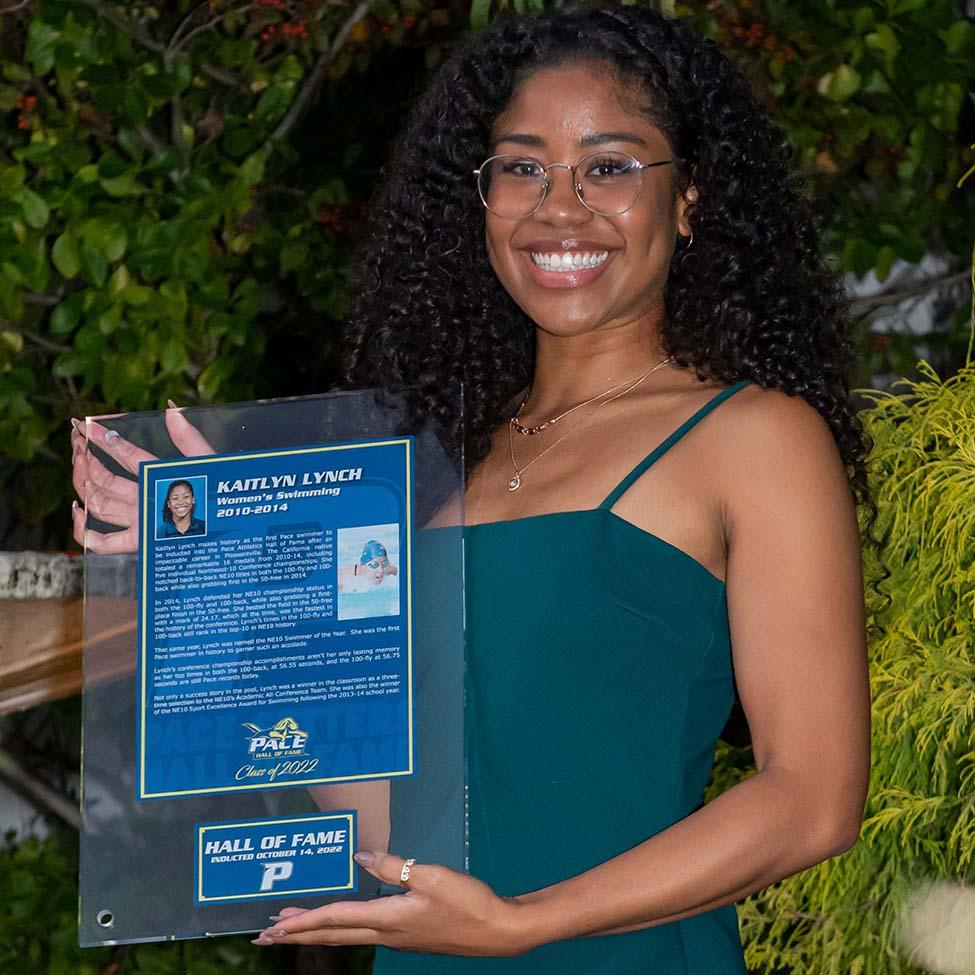
Kaitlyn Lynch made history as the first Pace swimmer to be inducted into the Hall of Fame after an impeccable career in Pleasantville. The California native totaled a remarkable 16 medals from 2010-14, including 5 individual Northeast-10 (NE-10) championships. She notched back-to-back NE-10 titles in both the 100-fly and 100-back while also grabbing first in the 50-free in 2014.
Lynch was also named the NE-10 Swimmer of the Year in 2014 after racing to 3 individual titles and 6 total medals in her final championship meet. Her excellence includes a lasting impression right here at Pace, as her top times in both the 100-back (56.55) and 100-fly (56.75) are still school records to this day.
Not only an athletic success story, Lynch also impressed in the Pace classroom. She was a three-time selection to the NE-10’s Academic All-Conference Team, to go along with winning the NE-10's Sport Excellence Award in 2014.
Barry Moriarty
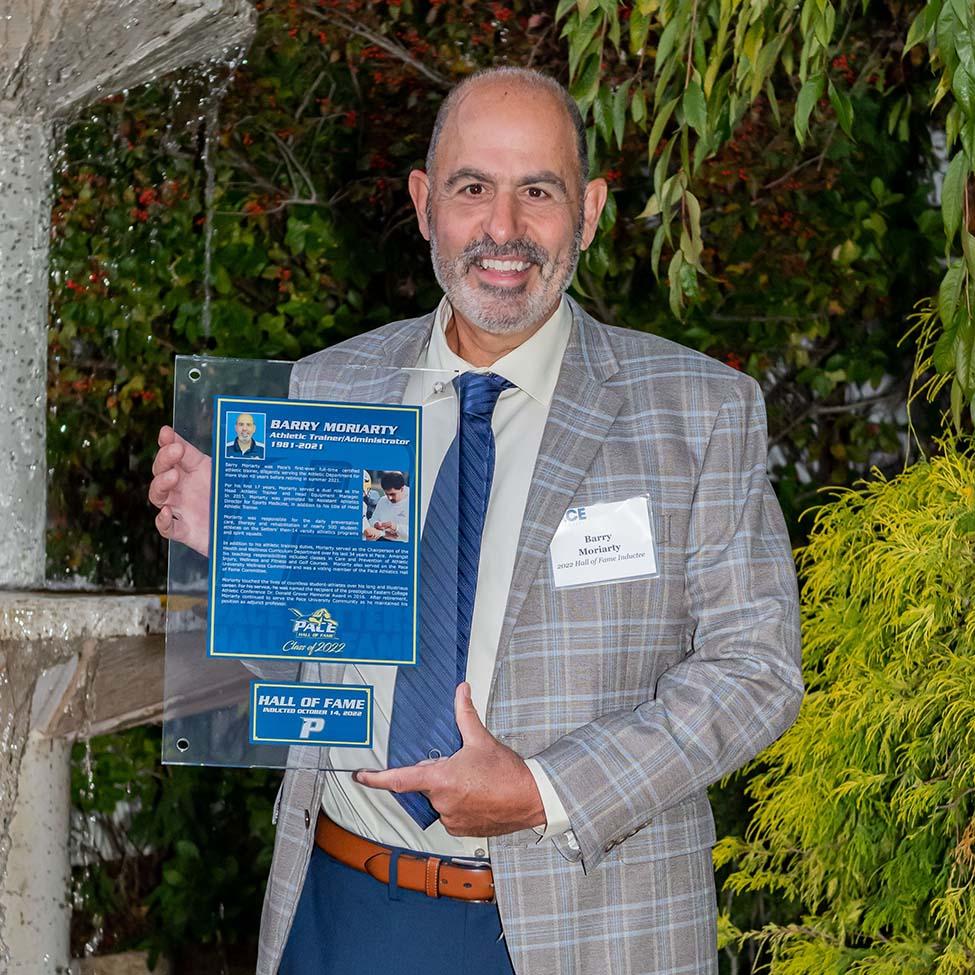
Barry Moriarty was Pace's first-ever full-time certified athletic trainer, diligently serving the Athletic Department for over 40 years before retiring this past summer. Moriarty was promoted to Assistant Athletics Director for Sports Medicine in 2015 in addition to his title as Head Athletic Trainer.
In addition to his athletic training duties, he served as the Chairperson of the Health and Wellness Curriculum Department over his last 34 years at Pace. On top of the chairperson role, he was also as an adjunct professor in the College of Health Professions. In his first 17 years with Pace Athletics, he also oversaw the operations of the equipment room.
Amongst his teaching responsibilities included classes in Care and Prevention of Athletic Injury, Wellness and Fitness, and Golf Courses. Moriarty also served on the Pace University Wellness Committee and was a voting member of the Pace Athletics Hall of Fame Committee.
Moriarty, who touched the lives of countless student-athletes over his long and illustrious career, was named the recipient of the Eastern College Athletic Conference's Dr. Donald Grover Memorial Award in 2016.
Larry Piediscalzo
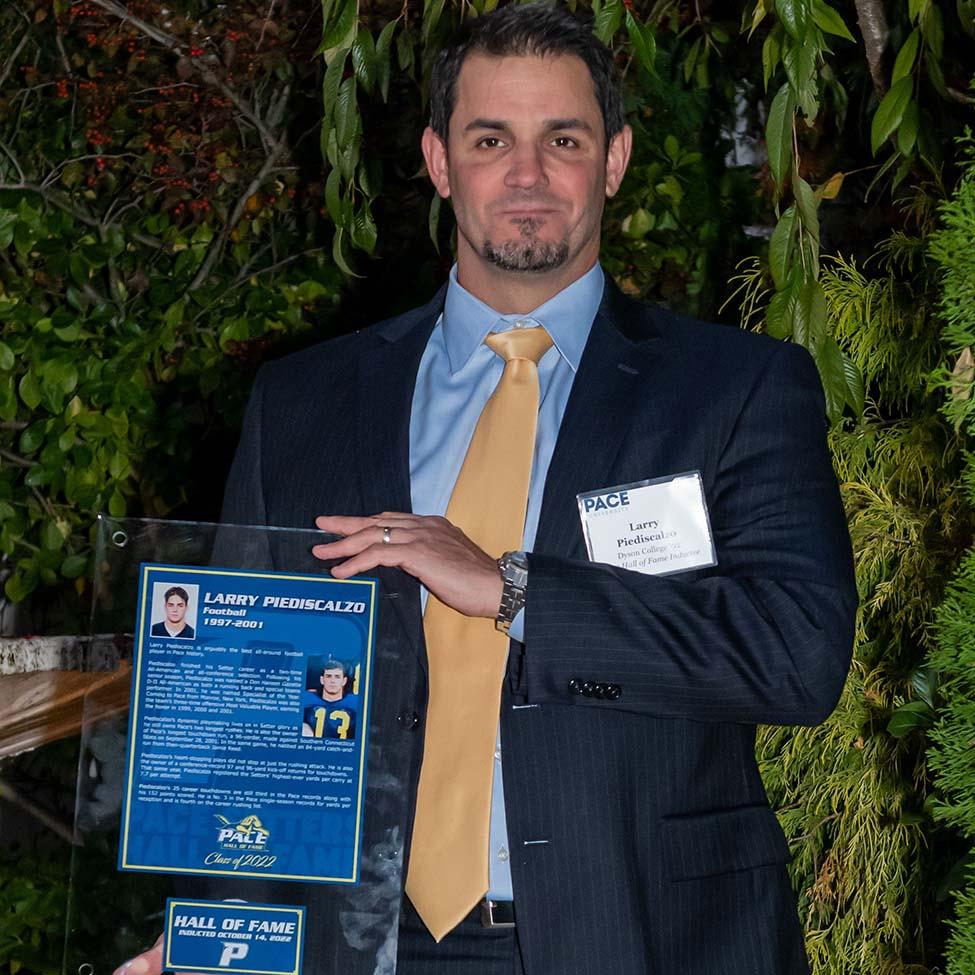
Larry Piediscalzo is arguably the best all-around football player in Pace history. In a career that spanned from 1997-2001, he was one of the most explosive players in the country. Following his senior season, Piediscalzo was named a Don Hansen Gazette D-II All-American as both a running back and a special teams performer and was Specialist of the Year in 2001. He finished his career as a two-time all-American and all-conference selection (2000, 2001) and the team's three-time offensive MVP (1999, 2000, 2001).
Piediscalzo's dynamic playmaking is still a lasting memory as he still owns Pace's two longest rushes. He rattled off a 96-yarder in 2001—which is still Pace's longest touchdown from scrimmage—while also breaking off a 90-yard run as a sophomore. In 2001, he also registered the Setters' highest-ever yards per carry at 7.7 per attempt.
Piediscalzo's jaw-dropping plays didn't stop at just the rushing attack. He added 97- and conference-record 96-yard kick-off return touchdowns as well in 2001, while also nabbing an 84-yard catch-and-run from quarterback Jamie Reed.
Brittany Shields
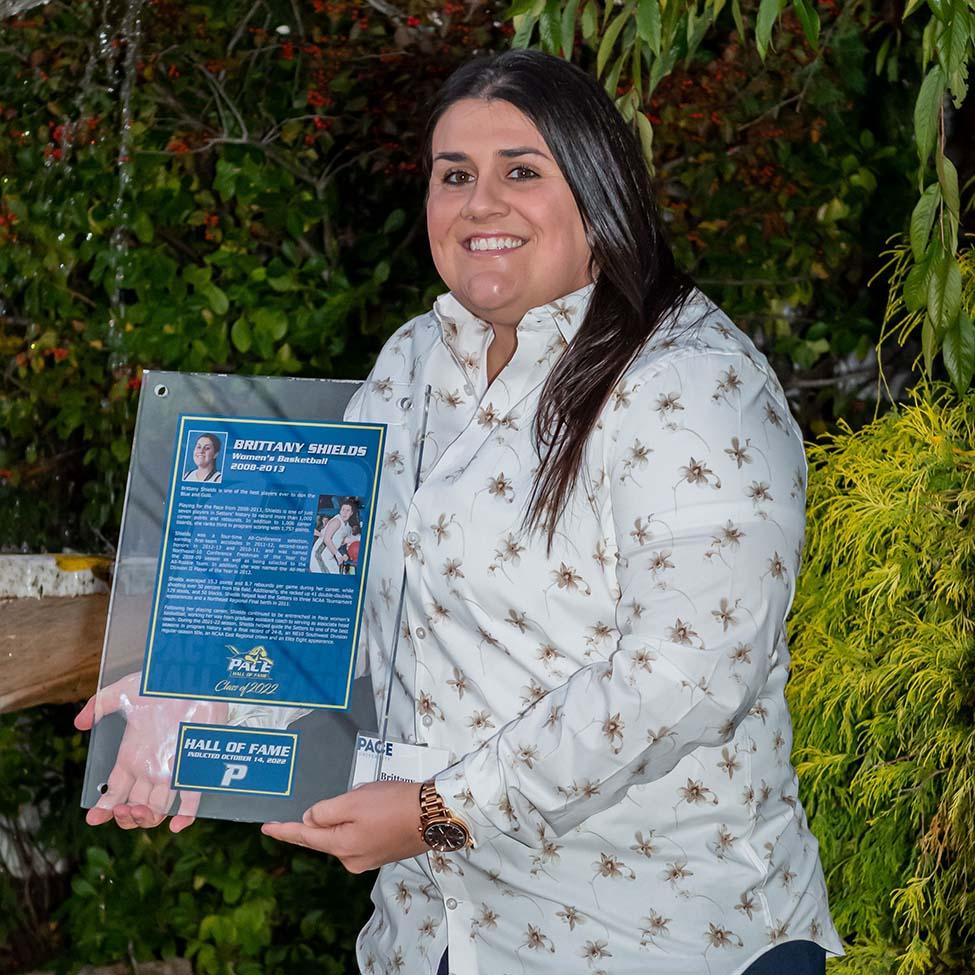
Brittany Shields, who is currently the associate head coach for the Pace women's basketball team, is also one of the best players ever to don the Blue and Gold. Playing for the Setters from 2008-2013, Shields is one of just seven players in Setters' history to record more than 1,000 career points and rebounds. In addition to 1,006 career boards, she ranks third in program scoring with 1,757 points.
Shields was a four-time All-Conference selection, earning First-Team accolades in 2011-12, Second-Team honors in 2012-13 and 2010-11, and was named NE-10 Conference Freshman of the Year for the 2008-09 season as well as being selected to the All-Rookie team. In addition, she was named the All-Met Division II Player of the Year in 2012.
Shields averaged 15.3 points and 8.7 rebounds per game during her career, while shooting over 50 percent from the field. Additionally, she racked up 41 double-doubles, 129 steals, and 50 blocks.
Ryan Williams
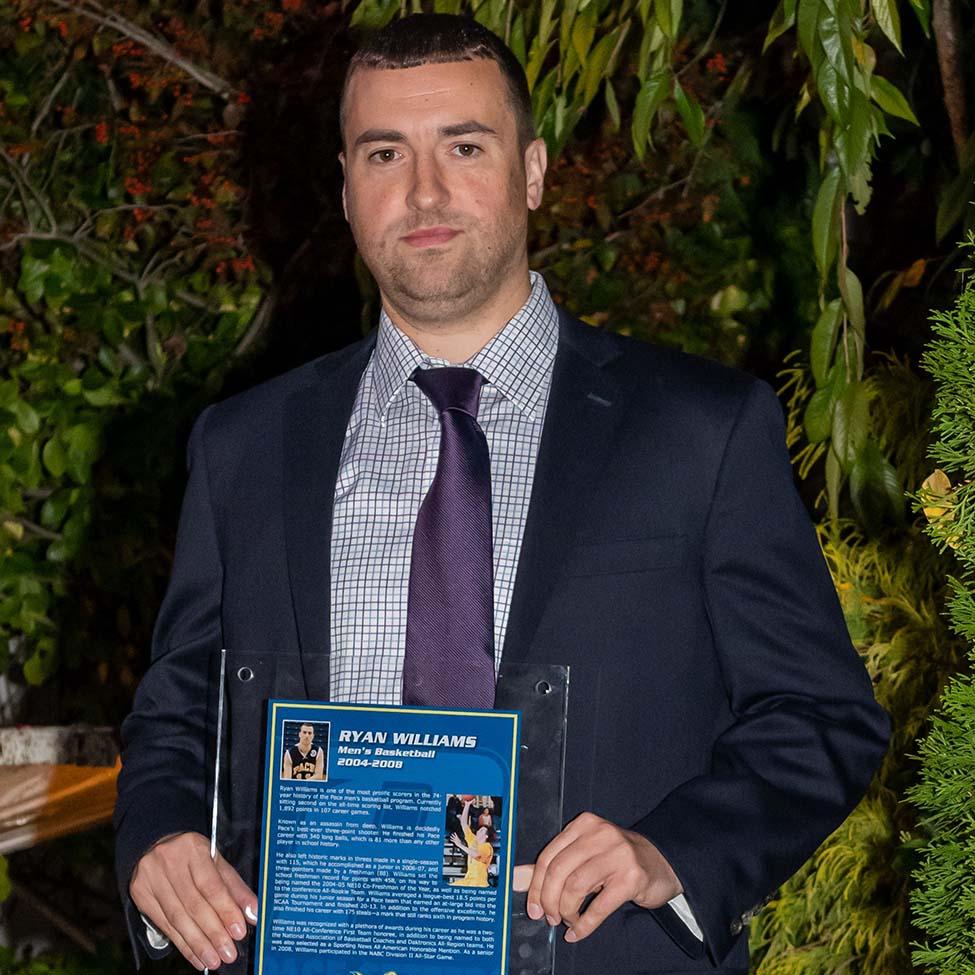
Ryan Williams is one of the most prolific scorers in the 74-year history of the Pace men's basketball program. Currently sitting second on the all-time scoring list, Williams notched 1,892 points in 107 career games.
Known as an assassin from deep, Williams is decidedly Pace's best-ever three-point shooter. He finished his career with 340 long balls, which is 81 more than any other player in school history.
Williams' junior year was especially sensational as he averaged 18.5 points per game for a Pace team that earned an at-large bid into the NCAA Tournament. In addition to the offensive excellence, he also finished his career with 175 steals—a mark that still ranks sixth in program history.
Williams was recognized for his efforts with a plethora of awards during his career. He was twice named to the NE10 All-Conference First Team, in addition to being named to both the NABC and Daktronics All-Region teams. Williams was also selected as an All-American Honorable Mention by Sporting News and a participant in the NABC's Division II All-Star Game.
Peter X. Finnerty Leadership Award Honorees
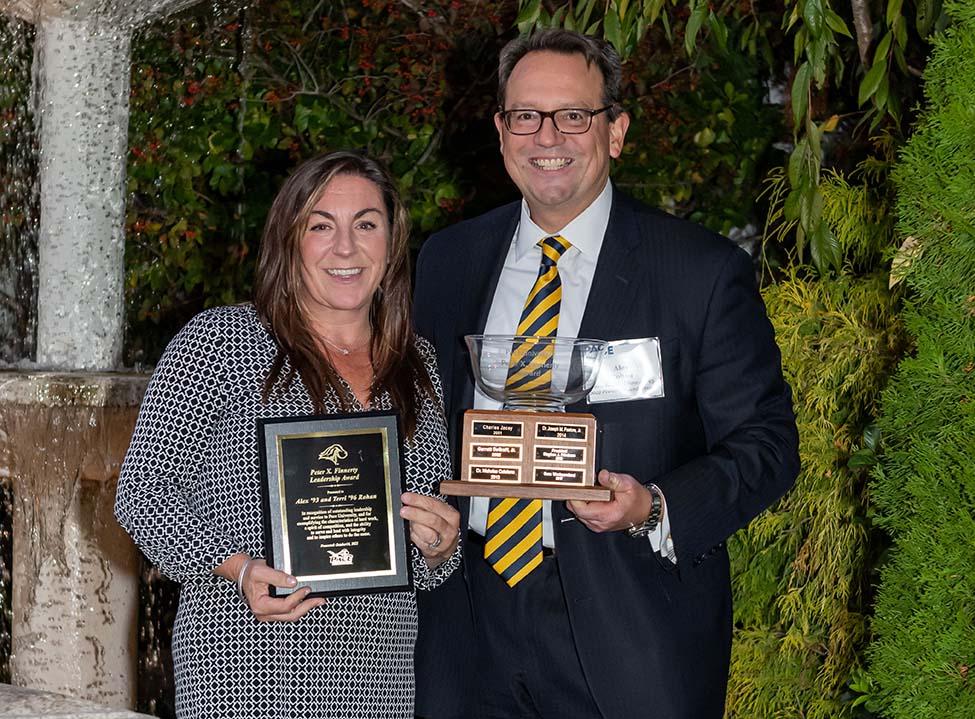
Alex and Terri Rohan
The Peter X. Finnerty Award is presented to a member or members of the Pace University athletics community for outstanding leadership and service to the University or to society as a whole. The individuals selected exemplify those characteristics for which Peter Finnerty was best known: hard work, a spirit of competition, the ability to serve and lead with integrity, and to inspire others to do the same. This honor has only been awarded seven times since its creation.
This year's honorees, Alex and Terri Rohan, have served as great contributors to the Pace Athletics Department over the years, specifically for the men's and women's lacrosse programs. Through their foundation, the May Ellen and Gerald Ritter Foundation, the Rohans have helped establish funds for men's and women's lacrosse which aid and enhance the development of these nationally competitive programs. Most recently, the Foundation created the establishing gift of the Dan Mulholland Endowment Fund in honor of the former head coach and founder of Pace men's lacrosse. Alex Rohan played goalkeeper and defense for the Pace Setters from 1990-92 under the tutelage of Mulholland.
Additionally, Alex assists in alumni engagement and networking as a mentor for senior student-athletes as they enter their professional careers.
More from Pace Magazine
Biology professor Nancy Krucher, PhD, understands the transformative power of research. She’s a pioneer in the fight against breast cancer, and she’s just received a three-year $400,241 grant from the National Cancer Institute through the National Institutes of Health to study new methods to combat cancer cell development of resistance to targeted treatments.
Through interdisciplinary collaboration, the School of Education and Dyson's Film and Screen Studies departments are helping a major school district in Florida tackle the challenges of today’s teacher shortage head-on.
Learning takes many forms. Thanks to the Office of Research and Graduate Education’s Classroom-Based Research Award, Occupational Therapy Professor Lisa Raymond-Tolan is adding student-created podcasts to her curriculum.
Revitalizing One Pace Plaza East
This past December, Pace University announced plans to transform One Pace Plaza to include new academic spaces, a modernized residence hall, and a new state-of-the-art Performing Arts Center that will serve its performing and creative arts programs and act as a central gathering space for our community and our neighborhood.


This past December, Pace University announced plans to transform One Pace Plaza to include new academic spaces, a modernized residence hall, and a new state-of-the-art Performing Arts Center that will serve its performing and creative arts programs and act as a central gathering space for our community and our neighborhood.
Once complete, Pace will have a modernized building that reduces carbon emissions and improves energy efficiency while providing faculty, students, and staff with the facilities they need.
“Our Campus Planning and Facilities team has spent many months meeting and consulting with stakeholders while conceptualizing this project,” said Pace President Marvin Krislov. “This project is a major step forward for Pace University. I am excited for this next chapter, and I look forward to continued discussion in the coming days, weeks, and months.”
While the final details of the renovation are still in development, here is the broad outline of the planned revitalization:
- Reconstruction of the lower floors of One Pace Plaza East, creating an inviting and modern building with classroom and creative arts spaces, collaboration spaces, and a Performing Arts Center that will include a proscenium theater to replace the Schimmel Center plus other theater and support spaces. This provides the up-to-date instructional, creative, and performance spaces we need, and it keeps our large gathering space—used by the entire University and the broader community—at the center of our campus.
- Renovations and upgrades to Maria’s Tower, providing additional, desirable residential spaces for students. This added capacity, when combined with the addition of 15 Beekman, will allow Pace to exit its leased residence hall at 55 John Street.
- When complete, One Pace Plaza will be fully modernized, including its outdated central plant, reducing carbon emissions. All code issues—present and upcoming—will be addressed for the entirety of One Pace Plaza.
Construction is expected to start in the fall of 2023 and be completed in early 2026. Pace’s Campus Planning and Facilities team has spent many months meeting and consulting with stakeholders while conceptualizing this project.
Funding for this ambitious project is coming from a variety of sources, including money set aside in Pace’s construction fund, the ability to issue debt, and fundraising. New York State and the federal funding will also complement a targeted fundraising campaign.
More from Pace Magazine
Biology professor Nancy Krucher, PhD, understands the transformative power of research. She’s a pioneer in the fight against breast cancer, and she’s just received a three-year $400,241 grant from the National Cancer Institute through the National Institutes of Health to study new methods to combat cancer cell development of resistance to targeted treatments.
Learning takes many forms. Thanks to the Office of Research and Graduate Education’s Classroom-Based Research Award, Occupational Therapy Professor Lisa Raymond-Tolan is adding student-created podcasts to her curriculum.
Through interdisciplinary collaboration, the School of Education and Dyson's Film and Screen Studies departments are helping a major school district in Florida tackle the challenges of today’s teacher shortage head-on.

